Sorted by date Results 51 - 75 of 114
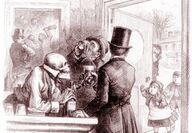
In 1853, a French-Canadian gambler, fighter, and all-around rascal by the name of Edouard Chambreau arrived in the brand-new town of Portland, ready to go into business. Chambreau had just come from the gold fields in northern California and southern Oregon, where he'd been wandering from town to town, fleecing miners and other gamblers and running from the occasional angry mob. But the previous year, he had met a woman – a nice, respectable girl by the name of Barbara Ann McBee. Despite his f...

In its early years, Oregon was at the outer limits of the known world, and that remoteness attracted all sorts of interesting characters. There were Joe Meek types, driven by a spirit of adventure; there were guys like William Ladd, who came hoping to get in on the ground floor and become the next generation of business barons; and, of course, there were the Marcus Whitmans and Jason Lees, the state's spiritual forefathers, come into the wilderness to save souls. But there was another kind of...

If you'd taken a nationwide poll in 1939, asking people from outside Oregon to name as many Oregon towns as they could, the top three would probably be Portland, Salem - and Valsetz. Portland, because it's the biggest, of course. Salem, because it's the state capitol. And Valsetz, because of its newspaper, the Valsetz Star, and the Star's editor, 11-year-old Dorothy Anne Hobson. The 9-year-old editor Dorothy Anne was the daughter of Henry and Ruby Hobson, the cookhouse managers for the tiny...
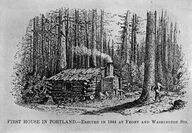
Most people know Prohibition in the United States started in 1920 when the Volstead Act went into effect. But in Oregon, Prohibition started quite a bit earlier than that. Actually, it started before Oregon was even a state. In 1844, the Oregon Territorial Government became the first in the United States to outlaw the use, manufacture or sale of booze. The full story of Oregon Territory's first experiment with Prohibition will probably never be known; not a lot of written history has come down...

Imagine you’re a gold prospector from the Willamette Valley, on your way to the California gold fields in the first year of the 1848 gold rush. You’re a little late to the party, and you’ve chosen to try to reach the gold fields in a somewhat unusual way: By going over the Coast Range to the beach, and traveling south along the coast. As you make your way southward by the great ocean, you reach a broad expanse of black sand. And when the sun hits it just right, you can see it’s actually glitter...
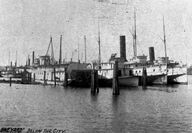
This is the story of Portland's coldest cold-case file - a suspicious death in the worst neighborhood of the old Stumptown waterfront, almost lost in the mists of time, 135 years ago. Was it an accident? Or a murder? We'll never know for sure. But there are good reasons to be suspicious. The Night Before Our story begins in a smoky, lamp-lit saloon in the rough part of Portland, back in early February of 1878. W.H. Harrigan, one of the tough, hardworking longshoremen who worked the docks in earl...
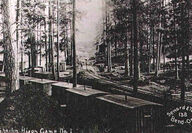
The U.S. Post Office inspector was puzzled. He'd just arrived at the tiny logging-company town of Shevlin, deep in the ponderosa pine woods south of Bend - and found it gone. Shade trees still towered over manicured home sites. A stray whiff drifted in the wind from an open pit where an outhouse once had stood. And on the spot where he'd expected to find the Shevlin Post Office, there was nothing but the bare outline of a building. The entire town of 600 was gone as if abducted by aliens. But...
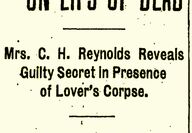
On June 20, 1907, a retired military man named Charles Reynolds was hurrying home as fast as he could - with a .38-caliber revolver in his pocket. Charles was an old U.S. Cavalryman in his 50s who had moved to Portland with his wife, Lulu, and his two grown children from a previous marriage. Charles had married Lulu in Colorado five years before when she was just 25 years old. In Portland, the Reynoldses were part owners of a bathhouse on the corner of Second and Washington and lived in a large...
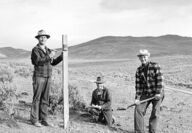
During the go-go years of the uranium-mining rush of the early 1950s, the character of the uranium prospector became iconic. He was basically the gold-seeking "miner 49er" updated for the atomic age: in lieu of a mule, he rode an Army-surplus Jeep; in place of pick and gold pan, he carried a Geiger counter and ultraviolet flashlight. For the better part of a decade seekers of "A-metal" deposits (the "A" stood for "Atomic") prowled all over the public lands of all the Western states, waving...

If you were a fan of the classic ABC television sitcom "Happy Days," you know The Fonz had a special relationship with two particular machines: His trusty '49 Triumph motorcycle, and the pinball machine in Al's diner. But it may surprise you to know that when Fonzie was playing that pinball machine, in 1950s Milwaukee, Wisc., he was breaking the law - and so was Al. It's a bit hard for younger Oregonians to believe, but just a few dozen years ago pinball was illegal in most large American...

Many historians, when asked to cite the single biggest and most far-reaching government misstep in American history, will immediately start talking about the First World War. By getting involved with that conflict - subtly at first, by lending money to the Allies, and later directly with American boots on French soil - we made it possible for one side to crush the other and impose its will, rather than simply fighting to an impasse and being forced to negotiate peace. The world is still trying...
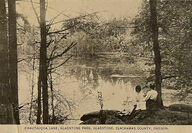
The Oregonian summarized the whole movement as "a great university whose students are scattered in homes, on farms, in shops and factories ... wherever a human soul carries the love of learning." A typical day at Chautauqua, circa 1899, started at 8 a.m. with prayers, calisthenics, and classes. Roughly 3,000 people attended on an average day, including some who camped there and many others who simply rode the trolley or electric railway from their nearby homes. At 11 a.m. would come the morning...
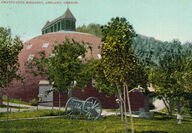
In the decades before the First World War, an organization called Chautauqua arose that was something like a summer camp for grown-ups. People would take vacation time and travel to the Chautauqua center and stay there in tents, either brought from home or rented on-site, for a week, or two weeks, or even longer. There, they'd take classes, attend lectures, listen to band concerts, play baseball, and generally try to make up for the previous year's intellectual deprivation. In Chautauqua's...
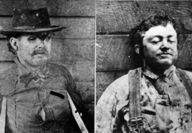
Imagine yourself as a television network executive at NBC in 1973. The bright, happy Western classic "Bonanza" is about to be canceled. In a last-ditch effort to save it from the ax, you've been asked to put a fresh, "western-noir" spin on the show so that it can compete with the darker TV fare that's now in fashion - like "All in the Family" and "M*A*S*H." Here's something you might come up with: Old Ben Cartwright, now that he's built the Bonanza Ranch to prominence, moves to Oregon with son...

It was a little after 6 a.m. on September 9, 1942. A tiny seaplane with red balls painted on its wings was making its way through the skies over Brookings, Oregon. At the controls was a young man named Nobuo Fujita; behind him, in the observer's seat, looking intensely at the ground, was another, named Shoji Okuda. The two of them were looking for a good place to initiate the first airstrike ever to be made on the continental United States. Fujita's plan This whole gambit had been Fujita's...

As urban legends, go, it's one of the oldest and scariest: A teenage couple drives to a secluded spot late at night and parks, planning to do some of the usual canoodling. But before they do, a news bulletin interrupts the music on the radio. A psychotic killer has escaped from the asylum, the DJ reports breathlessly. He's missing his left hand, and wears a steel hook on the stump of his arm as a prosthetic. The boy wants to ignore the news and smooch some more, but the girl is too freaked out,...

The “Oregon Style” of newspaper journalism was already a thing in 1871, when upstart newspaper publisher William “Bud” Thompson got in his famous gunfight in downtown Roseburg. But until that day, the vicious personal attacks that characterized the “Oregon Style” had mostly involved the spilling of ink — not blood. On that late Monday morning on a corner in downtown Roseburg, that changed. The enemies meet The groundwork for the Roseburg Newspaper Shootout was laid when Thompson came to town...

Lost or abandoned cabins pop up so often in legends of missing gold mines and buried treasure that they are almost a cliché. Most of them follow a clear pattern or formula - in fact, all lost-treasure stories do: The seeker stumbles across the treasure while doing something else; he is called away for some reason; and he can never find his way back, despite devoting years to fruitless searching. There may not be a more faithful example of that pattern than the story of the lost cabin of...
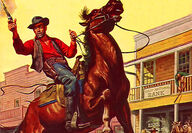
When the First National Bank of Joseph, Oregon, picked David Tucker as vice-president in 1928, it didn't look like a particularly unusual thing to do. Tucker was a widely respected part of the community in Joseph. A successful stockman, he had, over the previous 20 years, forged a reputation for himself as an honest, trustworthy man - and kind and generous to boot. He was especially effective at taking hotheaded young lads under his wing, helping them out of bad situations and inspiring them to...

Early Portland was a relatively corruption-friendly town. But even the best of us have our limits, as three Multnomah County Commissioners learned the hard way in 1924. In that year, the Portland area had a serious traffic congestion problem. The main source of the trouble was the Burnside Bridge, a swing-span setup that was at the time only 30 years old. However, it had deteriorated very badly, and was no longer considered safe. A new bridge was desperately needed. Luckily, in 1922 the three-me...
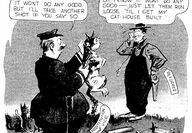
One November evening in 1885, Portland residents walking past a row of tiny houses at Third and Yamhill heard screams coming from one of them. Bursting in, they found the mutilated and lifeless remains of a 33-year-old French beauty known as Emma Merlotin. Someone had killed her brutally with a hatchet and then slipped away into the night. Emma, whose real name was Anna DeCoz, was a well-known "nymph du pave," as the Evening Telegram phrased it - basically, a courtesan. Her clientele included...
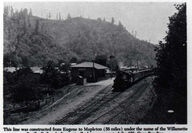
Very few people outside Coos County, and probably not that many inside it, know what a big deal Coos Bay is. It's the biggest deepwater har-bor on the Northwest coast -- that is, between San Francisco and Puget Sound. And it's far safer than Portland or Astoria, tucked as they are behind the "Graveyard of the Pacific" at the mouth of the Columbia. So, one has to wonder why it had no railroad connection to the outside world until 1916 -- more than 30 years after Portland got one. There have to...
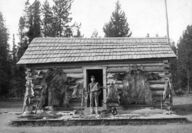
To Dr. W.H. Lytle, Oregon's state veterinarian, the entire idea was preposterous. A rabies outbreak in northeast Oregon? Bah. Rabies was barely known west of the Rockies. "However," he added - no doubt with an exasperated sigh - "we intend to investigate the situation in Wallowa County and ascertain the facts at once." Two weeks later, on Aug. 21, 1910, Dr. Lytle was back and ready to announce what he'd learned. As expected, he'd found no evidence of rabies, he told the Portland Morning...
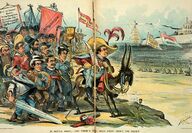
Many people today think of the 1890s as a prosperous, carefree era - the term "gay '90s" (or even "naughty '90s) jumps to mind. But what most people don't realize is that much of that decade was spent mired in a massive economic depression In many ways, the "Panic of 1893" was worse than the Great Depression. It brought us some iconic images that are still familiar today. The stereotype of the palatial Victorian "haunted house," as seen on innumerable episodes of Scooby-Doo, comes from the...

It was January 3, 1852 - the middle of the night and the middle of winter, just off the middle of the Oregon Coast. The U.S. Army's schooner Captain Lincoln, carrying a detachment of U.S. Army dragoons and supplies to reinforce a garrison near Port Orford, was getting badly abused by the weather. Wave after massive wave descended on the hapless Captain Lincoln, opening up a thousand little leaks in its hull; the soldiers toiled below decks at the pumps, trying desperately to stay ahead of the...